- Home
- Cassandra Clare
Chain of Iron Page 2
Chain of Iron Read online
Page 2
They had expected him home five days ago. But there had been no word save a terse letter sent from France. No promise that he would return by the day of Cordelia’s wedding. It was a wretched situation, made more wretched by the fact that neither Cordelia’s mother nor her brother, Alastair, was willing to discuss it.
Cordelia took a deep breath. “Mâmân. I know you’re still hoping Father might arrive in time for the wedding—”
“I do not hope; I know,” Sona said. “No matter what has waylaid him, he will not miss his only daughter’s wedding.”
Cordelia almost shook her head in wonderment. How could her mother have such faith? Her father had missed so many birthdays, even Cordelia’s first rune, because of his “sickness.” It was a sickness that had gotten him arrested in the end and sent to the Basilias in Idris. He was meant to be cured now, but his absence so far was not promising.
Boots clattered down the stairs, and Alastair appeared in the entrance hall, dark hair flying. He looked handsome in a new tweed winter coat, though he was scowling.
“Alastair,” Sona said. “Are you going to this sledding party as well?”
“I wasn’t invited.”
“That isn’t true,” Cordelia said. “Alastair, I was only going to go because you were!”
“I have decided that my invitation was sadly lost in the post,” Alastair said, with a dismissive wave of his hand. “I can entertain myself, Mother. Some of us have things to do and cannot be out cavorting at all hours.”
“Honestly, the two of you,” Sona scolded, shaking her head. This seemed to Cordelia to be highly unfair. She had only corrected Alastair’s untruth.
Sona placed her hands in the small of her back and sighed. “I ought to speak to Risa about tomorrow. There’s still so much to be done.”
“You should be resting,” Alastair called, as his mother headed down the corridor toward the kitchen. The moment she was out of sight, he turned to Cordelia, his expression stormy. “Was she waiting for Father?” he demanded in a low whisper. “Still? Why must she torment herself?”
Cordelia shrugged helplessly. “She loves him.”
Alastair made an inelegant sound. “Chi! Khodah margam bedeh,” he said, which Cordelia thought was very rude.
“Love doesn’t always make sense,” she said, and at that, Alastair looked quickly away. He had not mentioned Charles in Cordelia’s presence for some months, and though he’d received letters in Charles’s careful handwriting, Cordelia had found more than one tossed unopened into the dustbin. After a moment, she added, “Still, I wish he would send word that he’s all right, at least—for Mother’s sake.”
“He’ll come back in his own time. At the worst possible moment, if I know him.”
Cordelia stroked the soft lambswool of her muff with one finger. “Do you not want him to come back, Alastair?”
Alastair’s look was opaque. He had spent years protecting Cordelia from the truth, making excuses for their father’s “bouts of illness” and frequent absences. Some months ago Cordelia had learned the emotional cost of Alastair’s interventions, the invisible scars he worked so diligently to conceal.
He seemed about to reply when outside the window, the sound of a horse’s hooves echoed, their tromping muffled by the still-falling snow. The dark shape of a carriage came to a stop by the lamppost in front of the house. Alastair twitched the curtain aside and frowned.
“That’s the Fairchilds’ carriage,” he observed. “James couldn’t be bothered to pick you up, so he sent his parabatai to do his job?”
“That is not fair,” Cordelia said sharply. “And you know it.”
Alastair hesitated. “I suppose. Herondale has been dutiful enough.”
Cordelia watched as Matthew Fairchild leaped lightly down from the carriage outside. She couldn’t stop a flash of fear—what if James had panicked and sent Matthew to break things off with her the night before the wedding?
Don’t be ridiculous, she told herself firmly. Matthew was whistling as he came up the front steps. The ground was white with snow, tramped down here and there with boot prints. Flakes had already come to rest on the shoulders of Matthew’s fur-collared greatcoat. Crystals glittered in his blond hair, and his high cheekbones were flushed with cold. He looked like an angel painted by Caravaggio and sugar-dusted with snow. Surely he wouldn’t be whistling if he had bad news to deliver?
Cordelia opened the door and found Matthew on the front step, stamping snow from his balmoral boots. “Hello, my dear,” he said to Cordelia. “I’ve come to bring you to a large hill, which we will both hurtle down on rickety, out-of-control bits of wood.”
Cordelia smiled. “Sounds marvelous. What will we do after that?”
“Unaccountably,” Matthew said, “we will climb back to the top of the hill in order to do it again. It is some kind of snow-related mania, they say.”
“Where’s James?” Alastair interrupted. “You know, the one of you that was supposed to be here.”
Matthew regarded Alastair with dislike. Cordelia felt a familiar sinking of her heart. This was how it always went now, when Alastair interacted with any of the Merry Thieves. Suddenly, a few months ago, they had all become enormously angrier at Alastair, and she had no idea why. She couldn’t bring herself to ask. “James was called away on important business.”
“What business?” said Alastair.
“No business of yours,” Matthew said, clearly pleased with himself. “Rather walked into that one, eh?”
Alastair’s black eyes glittered. “You had best not lead my sister into trouble, Fairchild,” he said. “I know the kind of company you keep.”
“Alastair, stop it,” Cordelia said. “Now, are you really skipping out on the Pouncebys’ party or were you just needling Mother? And if the latter, do you wish to accompany Matthew and myself in the carriage?”
Alastair’s gaze flicked to Matthew. “Why,” he said, “are you not even wearing a hat?”
“And cover up this hair?” Matthew indicated his golden locks with a flourish. “Would you blot out the sun?”
Alastair wore the sort of expression that indicated that no amount of eye rolling would be enough. “I,” he said, “am going for a walk.”
He stalked out into the snowy night without another word, the effect of his exit dampened by the snow swallowing up the tread of his boots.
Cordelia sighed and started down the walk with Matthew. South Kensington was a fairy tale of white houses frosted in shimmering ice, the glow of the streetlamps shrouded in halos of snow-softened mist. “I feel I am ever apologizing for Alastair. Last week he made the milkman cry.”
Matthew handed her up to the carriage seat. “Never apologize for Alastair to me. He provides me an adversary to sharpen my wits on.”
He swung himself up next to her and closed the heavy door. The silk-lined interior of the carriage was made cozy by soft cushions and velvet curtains over the windows. Cordelia sat back against the bench, the sleeve of Matthew’s greatcoat brushing her arm reassuringly.
“I feel as if I haven’t seen you in an age, Matthew,” she said, happy to change the subject. “I heard your mother was back from Idris? And Charles from Paris?” As Consul, Matthew’s mother, Charlotte, was often away from London. Her son Charles, Matthew’s brother, had taken a junior position at the Paris Institute, where he was training in politics: everyone knew Charles hoped to be the next Consul someday.
Matthew ran his fingers through his hair, dislodging ice crystals. “You know Mother—the minute she steps from her carriage she’s off and running again. And of course Charles lost no time in coming home to see her. Reminding the Paris Institute of how close he is to the Consul, how much she depends on his advice. Pontificating to Father and Martin Wentworth. When I left, he had interrupted their chess match to try to drag them into a discussion of Downworlder politics in France. Wentworth was looking a bit desperate, actually—probably hoping Christopher would cause another explosion in the lab to give him an opp
ortunity to escape.”
“Another explosion?”
Matthew grinned. “Kit almost blew off Thomas’s eyebrows with the latest experiment. He says he’s close to making gunpowder ignite even in the presence of runes, but Thomas has no eyebrows left to give to the cause of science.”
Cordelia tried to think of something to say about Thomas’s eyebrows but couldn’t. “All right,” she said, hugging her arms around herself. “I give up. Where is James? Has he taken fright and legged it for France? Is the wedding off?”
Matthew pried a silver flask from his coat and took a nip before replying. Was he buying himself time? He did look a bit worried, Cordelia thought, though anxiety and Matthew were things that rarely went together. “That’s my fault, I’m afraid,” he admitted. “Well, me and the rest of the Merry Thieves, to be fair. At the last minute, we just couldn’t let James tie the knot without throwing him a party, and it’s my job to make sure that you know nothing of the scandalous proceedings.”
Relief passed over Cordelia in a wave. James wasn’t abandoning her. Of course not. He never would. He was James.
She squared her shoulders. “Since you just told me that the proceedings will be scandalous, doesn’t that mean you’ve failed in your mission?”
“Not at all!” Matthew took another drink from the flask before replacing it in his pocket. “I’ve only told you that James is spending the eve of his wedding night with his friends. For all you know, they’re having tea and studying the history of faeries in Bavaria. I’m meant to make sure you don’t learn otherwise.”
Cordelia couldn’t help but smile. “And how do you intend to do that?”
“By escorting you to scandalous proceedings of your own, of course. You didn’t think we were really going to the Pouncebys’ party?”
Cordelia drew back the curtain of the carriage window and looked out into the night. Instead of the tree-lined streets of Kensington, shrouded in winter snow, they had arrived at the outer edge of the West End. The streets were narrow and thick with fog, and crowds of people milled about, speaking in a dozen languages, warming their hands over fires in oil drums.
“Soho?” she said curiously. “What—the Hell Ruelle?”
Matthew cocked an eyebrow. “Where else?” The Hell Ruelle was a Downworlder nightclub and salon, operating a few nights of each week in an outwardly nondescript building on Berwick Street. Cordelia had ventured there twice before, months ago. Her visits had been memorable.
She let the curtain fall and turned back to Matthew, who was watching her closely. She pretended to stifle a yawn. “Really, the Ruelle again? I’ve been there so often it might as well be a ladies’ bridge club. Surely you must know a more scandalous place?”
Matthew grinned. “Are you asking me to take you to the Inn of the Shaved Werewolf?”
Cordelia hit him with her muff. “That’s not a real place. I refuse to believe it.”
“Believe me when I say that there are few places more scandalous than the Ruelle, and none I could take you to and expect James to forgive me,” said Matthew. “Corrupting one’s parabatai’s bride is not considered sporting.”
The laughter went out of Cordelia; she suddenly felt very tired. “Oh, Matthew, you know it’s a fake wedding,” she said. “It doesn’t matter what I do. James won’t care.”
Matthew seemed to hesitate. Cordelia had broken with the masquerade, and he was clearly taken aback. He never remained speechless for long, though. “He does care,” he said, as the carriage turned onto Berwick Street. “Not, perhaps, in the way everyone imagines. But I don’t think it will be a hardship to be married to James, and it is only for a year, isn’t it?”
Cordelia closed her eyes. That was the agreement she had made with James: one year of marriage, to save both their reputations. Then she would sue for divorce. They would part amicably and remain friends.
“Yes,” she said. “Only a year.”
The carriage drew to a stop, just beneath a streetlamp whose yellow light illuminated Matthew’s face. Cordelia felt a small catch at her heart. Matthew knew as much of the truth as anyone else, even James, did, but there was something in his eyes—something that made her fear for a moment that he suspected the last piece of the puzzle, the bit she’d hidden from everyone but herself. She couldn’t bear to be pitied. She couldn’t bear it if anyone knew how desperately she loved James and wished the marriage were a real one.
Matthew pushed the door of the carriage open, revealing the pavement of Berwick Street, glossy with melted snow. He jumped out and, after a quick conversation with the driver, reached up to help Cordelia down from the carriage.
The Hell Ruelle was reached through the narrow alley of Tyler’s Court. Matthew took Cordelia’s arm and tucked it through his, and together they made their way through the shadows. “It occurs to me,” he said, “that while we may know the truth, the rest of the Enclave doesn’t. Remember what pests they were when you first came to London—and now, as far as that smug bunch is concerned, you’re marrying one of the most eligible bachelors in the country. Look at Rosamund Wentworth. She’s gone and gotten herself engaged to Thoby Baybrook just to prove you’re not the only one getting married.”
“Really?” Cordelia was highly entertained; it had never occurred to her she had anything to do with Rosamund’s sudden announcement. “But I assume that marriage is a love match.”
“The timing raises questions, is all I’m saying.” Matthew waved a hand airily. “My only point is, you may as well rejoice in being the envy of all London. Everyone who was snide to you when you first arrived—everyone who shorted you because of your father, or muttered rumors—they’ll be eating their hearts out with envy, wishing they were you. Enjoy it.”
Cordelia chuckled. “You always do find the most decadent possible solution to any problem.”
“I believe that decadence is a valuable perspective that should always be considered.” They had reached the entrance of the Hell Ruelle and passed through a private door into a narrow hallway lined with heavy tapestries. The corridor was seemingly done up for Christmas (though the holiday itself was weeks away); the tapestries were adorned with green boughs wound with white roses and red poppies.
They found their way through a labyrinth of small salons to the octagonal main room of the Ruelle. It had been transformed; shimmering trees, their bare boughs and trunks painted white, stood at intervals, festooned with dark green wreaths and dangling red glass globes. A glimmering mural portrayed a forest scene: a glacier edged by a grove of snowcapped pines, owls peeking out from the shadows between the trees. A black-haired woman with the body of a serpent coiled around a lightning-struck tree; her scales gleamed with gold paint. At the front of the room, Malcolm Fade, the purple-eyed High Warlock of London, seemed to be leading a group of faeries in an intricate dance.
The floor was piled with heaps of what looked like snow, but on closer examination was delicately cut white paper, kicked up in drifts by dancing Downworlders. Not everyone was dancing, of course: many of the salon’s guests were crowded at small circular tables, their hands wrapped around copper mugs of mulled wine. Nearby, a werewolf and a faerie sat together, arguing about Irish home rule. Cordelia had always marveled at the mix of Downworlders that attended the Hell Ruelle; enmities out in the world between vampires and werewolves, or between different faerie courts, seemed to be suspended for the sake of art and poetry. She could understand why Matthew liked it so much.
“Well, well, my favorite Shadowhunter,” drawled a familiar voice. Turning, Cordelia recognized Claude Kellington, a young werewolf musician who oversaw the entertainment at the Ruelle. He was seated at a table with a faerie woman with long, blue-green hair; she stared curiously at Cordelia. “I see you brought Fairchild,” Kellington added. “Convince him to be more entertaining, will you? He never dances.”
“Claude, I am crucial to your entertainments,” Matthew said. “I am that irreplaceable thing, the eager audience.”
“Well, bri
ng me more performers like this one,” Kellington said, indicating Cordelia. “If you happen to meet any.”
Cordelia couldn’t help but recall the performance that had so impressed Kellington. She’d danced on the Ruelle’s stage, so scandalously that she’d rather shocked herself. She tried not to blush now, but rather to appear a sophisticated sort of girl prepared to dance like Salome at the drop of a hat.
She nodded at the decorated boughs. “Is Christmas celebrated at the Hell Ruelle, then?”
“Not exactly.” Cordelia turned to see Hypatia Vex, the patroness of the Hell Ruelle. Though Malcolm Fade owned the place, the guests were invited by Hypatia; anyone she disapproved of would never make it past the door. She wore a shimmering red gown, and a gilt-dipped peony was tucked into her cloud of dark hair. “The Ruelle does not celebrate Christmas. Its attendees may do what they like in their own homes, of course, but in December the Ruelle pays homage rather to its patron with the Festum Lamia.”
“Its patron? You mean… you?” said Cordelia.
There was a hint of amusement in Hypatia’s distinctive eyes with their star-shaped pupils. “Its cosmic patron. Our ancestor, called by some the mother of warlocks, by others the Mother of Demons.”
“Ah,” said Matthew. “Lilith. Now that you point it out, you do have rather a lot more owls in the decor than usual.”
“The owl is one of her symbols,” said Hypatia, gliding a hand along the back of Kellington’s chair. “In the first days of the Earth, God made for Adam a wife. Her name was Lilith, and she would not be subservient to Adam’s wishes, so she was cast from the Garden of Eden. She mated with the demon Sammael, and with him had many demon children, whose offspring were the first warlocks. This angered Heaven, and three vengeful angels—Sanvi, Sansanvi, and Semangelaf—were sent to punish Lilith. She was made barren by the angels, banished to the realm of Edom, a wasteland of night creatures and screech owls, where she resides still. But she stretches out her hand sometimes to assist warlocks who are faithful to her cause.”

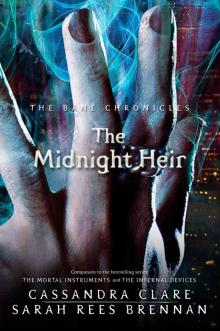 The Midnight Heir
The Midnight Heir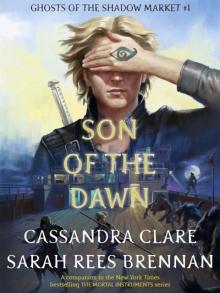 Son of the Dawn
Son of the Dawn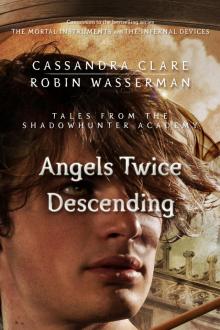 Angels Twice Descending
Angels Twice Descending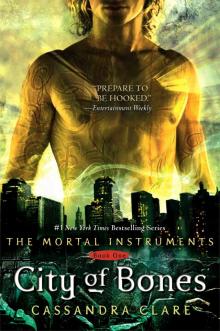 City of Bones
City of Bones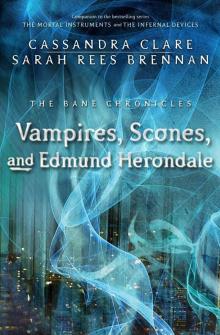 Vampires, Scones, and Edmund Herondale
Vampires, Scones, and Edmund Herondale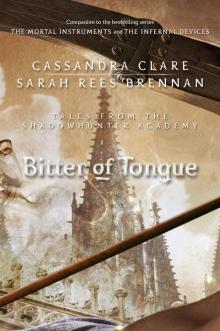 Bitter of Tongue
Bitter of Tongue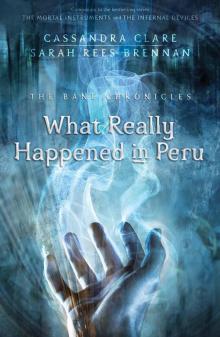 What Really Happened in Peru
What Really Happened in Peru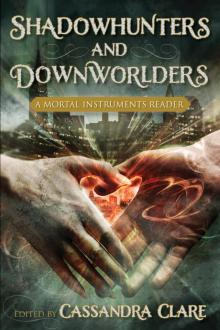 Shadowhunters and Downworlders
Shadowhunters and Downworlders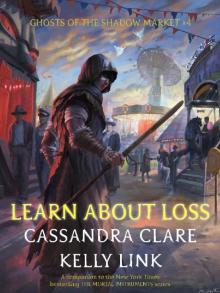 Learn About Loss
Learn About Loss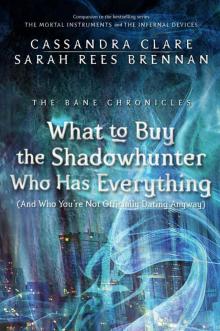 What to Buy the Shadowhunter Who Has Everything
What to Buy the Shadowhunter Who Has Everything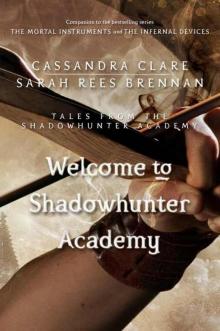 Welcome to Shadowhunter Academy
Welcome to Shadowhunter Academy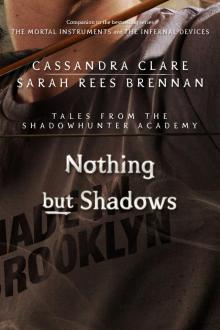 Nothing but Shadows
Nothing but Shadows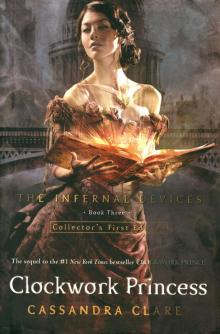 Clockwork Prince
Clockwork Prince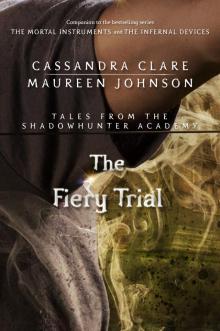 The Fiery Trial
The Fiery Trial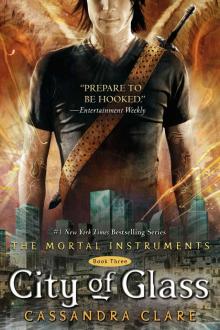 City of Glass
City of Glass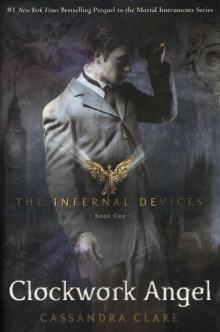 Clockwork Angel
Clockwork Angel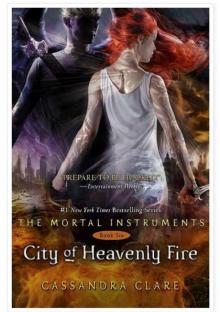 City of Heavenly Fire
City of Heavenly Fire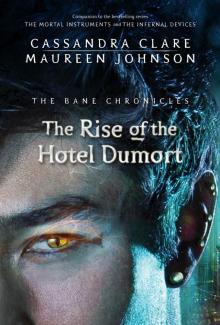 The Rise of the Hotel Dumort
The Rise of the Hotel Dumort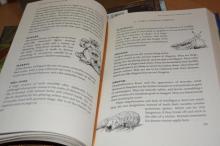 The Shadowhunters Codex
The Shadowhunters Codex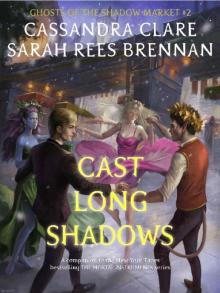 Cast Long Shadows
Cast Long Shadows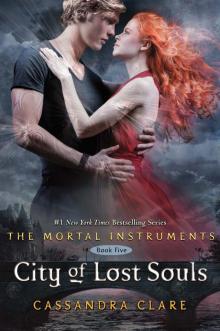 City of Lost Souls
City of Lost Souls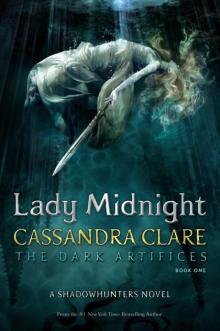 Lady Midnight
Lady Midnight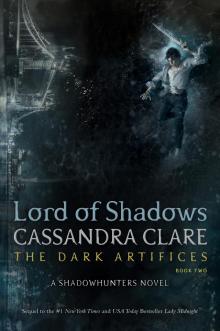 Lord of Shadows
Lord of Shadows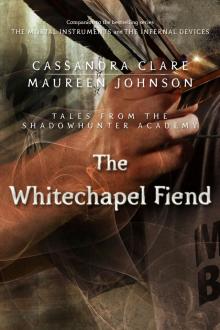 The Whitechapel Fiend
The Whitechapel Fiend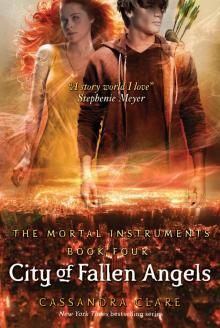 City of Fallen Angels
City of Fallen Angels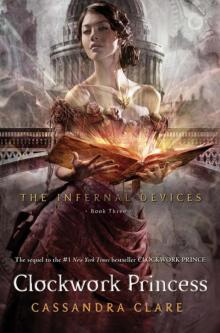 Clockwork Princess
Clockwork Princess Queen of Air and Darkness
Queen of Air and Darkness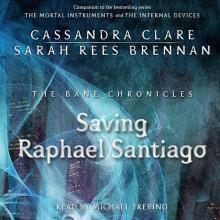 Saving Raphael Santiago
Saving Raphael Santiago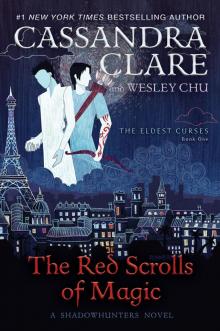 The Red Scrolls of Magic
The Red Scrolls of Magic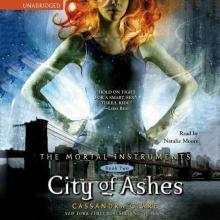 City of Ashes
City of Ashes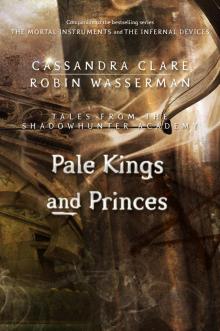 Pale Kings and Princes
Pale Kings and Princes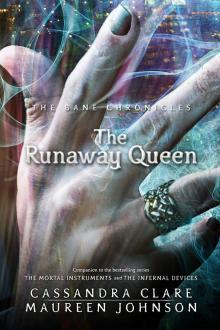 The Runaway Queen
The Runaway Queen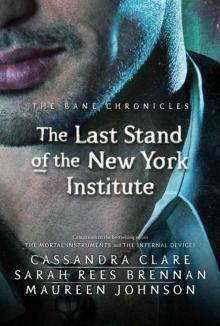 The Last Stand of the New York Institute
The Last Stand of the New York Institute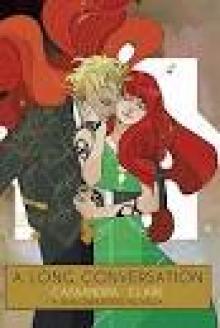 A Long Conversation (The Shadowhunter Chronicles)
A Long Conversation (The Shadowhunter Chronicles)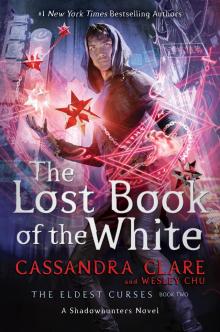 The Lost Book of the White
The Lost Book of the White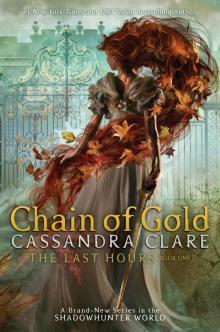 Chain of Gold
Chain of Gold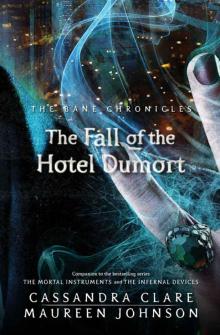 The Fall of the Hotel Dumort
The Fall of the Hotel Dumort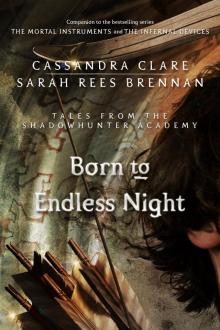 Born to Endless Night
Born to Endless Night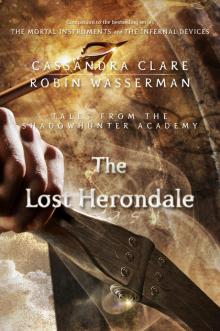 The Lost Herondale
The Lost Herondale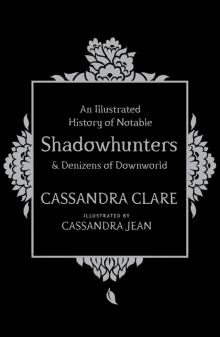 An Illustrated History of Notable Shadowhunters & Denizens of Downworld
An Illustrated History of Notable Shadowhunters & Denizens of Downworld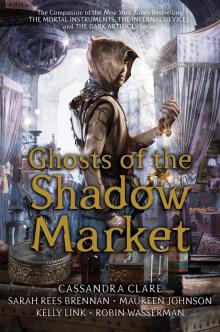 Ghosts of the Shadow Market
Ghosts of the Shadow Market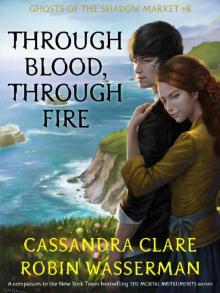 Through Blood, Through Fire
Through Blood, Through Fire Every Exquisite Thing
Every Exquisite Thing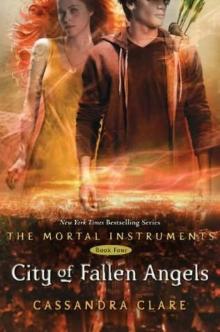 City of Fallen Angels mi-4
City of Fallen Angels mi-4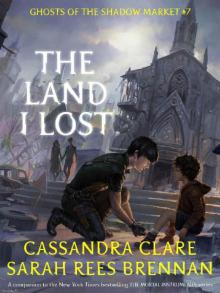 The Land I Lost (Ghosts of the Shadow Market Book 7)
The Land I Lost (Ghosts of the Shadow Market Book 7)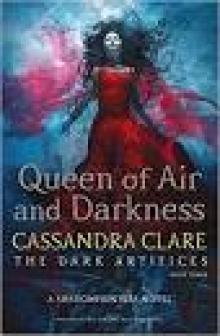 Queen of Air and Darkness (The Dark Artifices #3)
Queen of Air and Darkness (The Dark Artifices #3)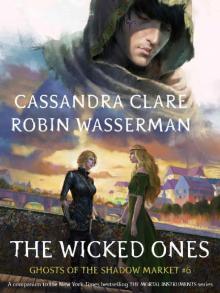 The Wicked Ones (Ghosts of the Shadow Market Book 6)
The Wicked Ones (Ghosts of the Shadow Market Book 6)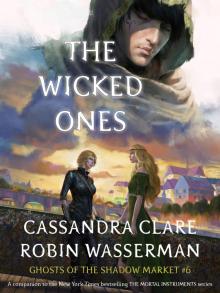 The Wicked Ones
The Wicked Ones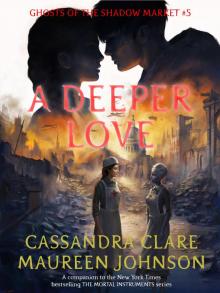 A Deeper Love
A Deeper Love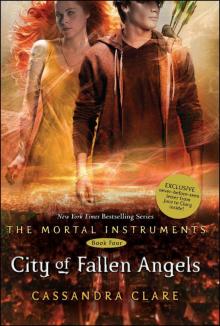 City of Fallen Angels (4)
City of Fallen Angels (4)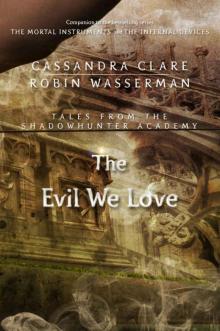 The Evil We Love (Tales from the Shadowhunter Academy Book 5)
The Evil We Love (Tales from the Shadowhunter Academy Book 5)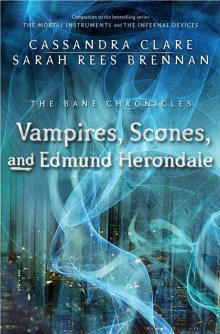 Vampires, Scones, and Edmund Herondale tbc-3
Vampires, Scones, and Edmund Herondale tbc-3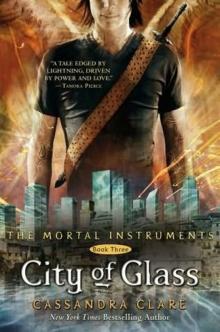 City of Glass mi-3
City of Glass mi-3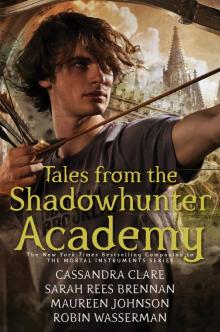 Tales from the Shadowhunter Academy
Tales from the Shadowhunter Academy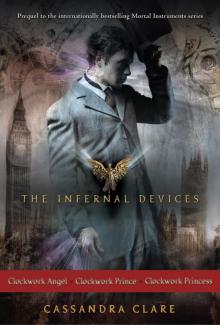 The Infernal Devices Series
The Infernal Devices Series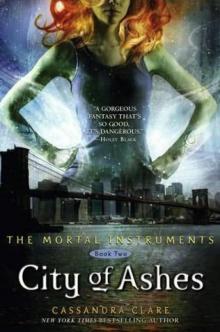 City of Ashes mi-2
City of Ashes mi-2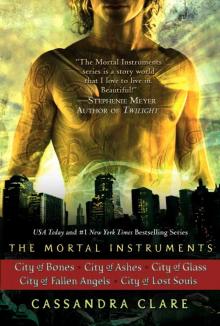 Cassandra Clare: The Mortal Instruments Series
Cassandra Clare: The Mortal Instruments Series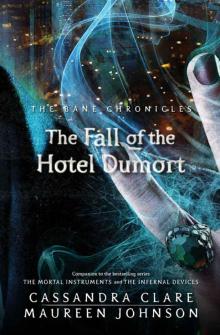 The Bane Chronicles 7: The Fall of the Hotel Dumort
The Bane Chronicles 7: The Fall of the Hotel Dumort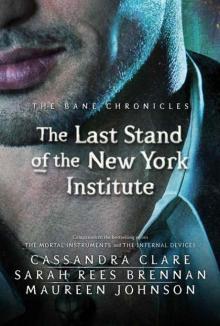 The Last Stand of the New York Institute (The Bane Chronicles)
The Last Stand of the New York Institute (The Bane Chronicles)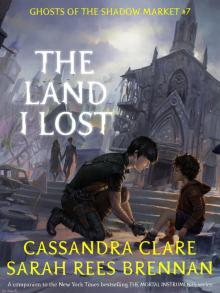 The Land I Lost
The Land I Lost![Saving Raphael Santiago - [Bane Chronicles 06] Read online](http://i1.bookreadfree.com/i1/04/03/saving_raphael_santiago_-_bane_chronicles_06_preview.jpg) Saving Raphael Santiago - [Bane Chronicles 06]
Saving Raphael Santiago - [Bane Chronicles 06]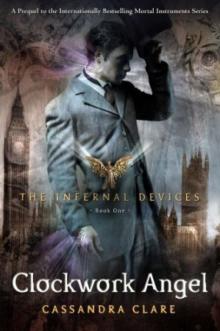 Clockwork Angel tid-1
Clockwork Angel tid-1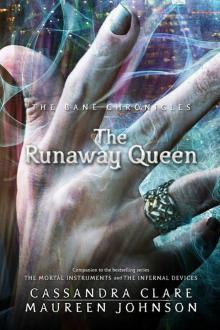 The Runaway Queen tbc-2
The Runaway Queen tbc-2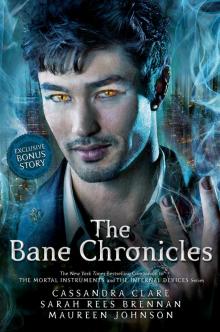 The Bane Chronicles
The Bane Chronicles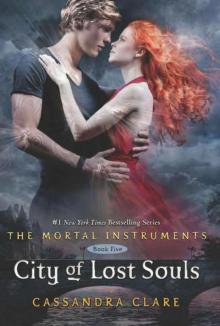 City of Lost Souls mi-5
City of Lost Souls mi-5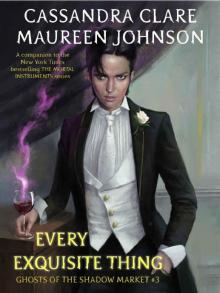 Every Exquisite Thing (Ghosts of the Shadow Market Book 3)
Every Exquisite Thing (Ghosts of the Shadow Market Book 3)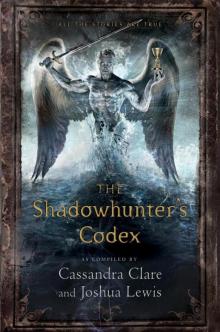 Shadowhunter’s Codex
Shadowhunter’s Codex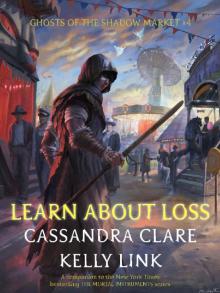 Learn About Loss (Ghosts of the Shadow Market Book 4)
Learn About Loss (Ghosts of the Shadow Market Book 4)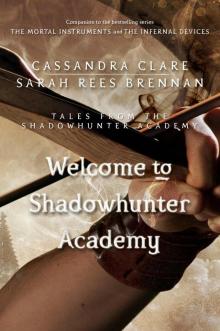 Welcome to Shadowhunter Academy (Tales from the Shadowhunter Academy Book 1)
Welcome to Shadowhunter Academy (Tales from the Shadowhunter Academy Book 1)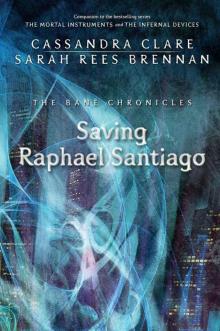 Saving Raphael Santiago tbc-6
Saving Raphael Santiago tbc-6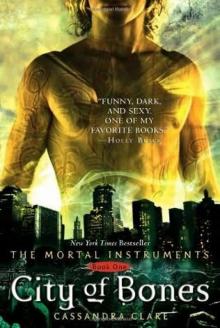 City of Bones mi-1
City of Bones mi-1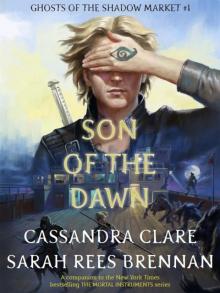 Ghosts of the Shadow Market Book 1_Son of the Dawn
Ghosts of the Shadow Market Book 1_Son of the Dawn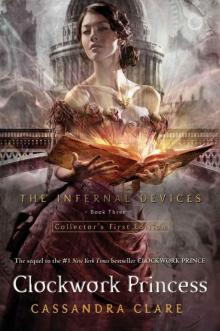 Clockwork Princess (Infernal Devices, The)
Clockwork Princess (Infernal Devices, The)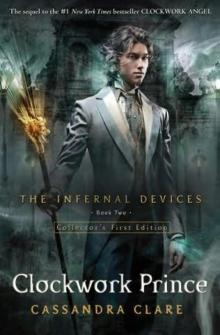 Clockwork Prince tid-2
Clockwork Prince tid-2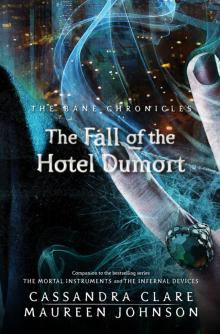 No Immortal Can Keep a Secret
No Immortal Can Keep a Secret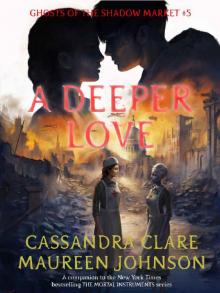 A Deeper Love (Ghosts of the Shadow Market Book 5)
A Deeper Love (Ghosts of the Shadow Market Book 5)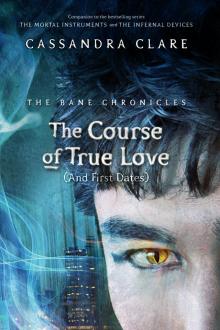 The Course of True Love (and First Dates)
The Course of True Love (and First Dates)